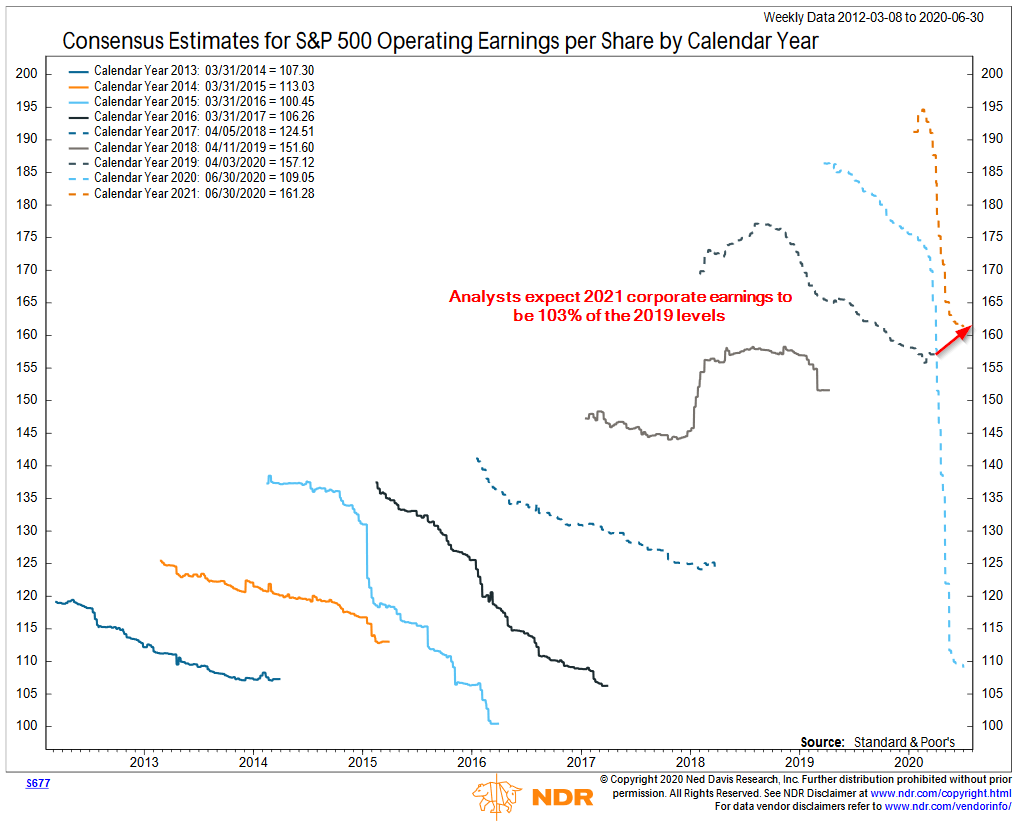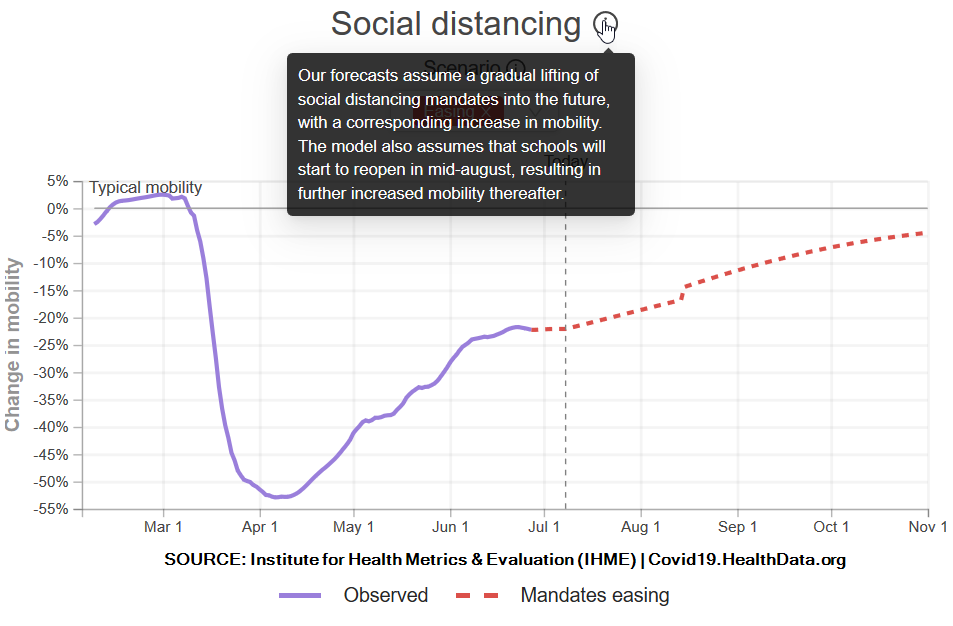The economic data continues to show signs of improvement while the number of Coronavirus cases and now the daily death numbers begin to rise again. This has led to some states to slow or even reverse their re-opening plans. Scientists are learning more and more about the virus, yet it seems half of the country refuses to listen because scientists were "wrong" in February and March while the other half of the country sees every uptick in cases as a sign we need to shut the whole country down again.
(I realize that's an exaggeration as polls show a large portion of the country is somewhere in the middle. The problem is the vocal far left and far right positions are what gets all the attention.)
As I've done throughout this pandemic, I'll attempt to focus on data and logic to help us navigate this environment. In my Monday musings I talked about the "relative" vs "absolute" recovery.

Everyone is excited because the economic numbers are going up. What they aren't focused on is where we actually end up. After being down so far, anything looks good right now.
I've shown these charts the last two weeks illustrating where we are versus the pre-COVID19 levels.


The problem is, the stock market is counting on a 103% recovery of earnings by 2021.

This has led to extremely high valuations, which creates risks of severe corrections in prices if the economic recovery does not achieve the same levels.

Without getting into the politics of Coronavirus, masks, and shutdowns, what will make a huge difference is how quickly we are able to resume "normal" activities. We shouldn't expect economic output to get back to February levels unless we can both move freely AND have confidence those who are at higher risk are not going to be hospitalized or die from COVID19. One chart I've started watching more closely is the mobility index from the Institute of Health Metrics & Evaluation.

We can see the sharp upturn in mobility as states began to re-open, but the recent spike in cases has caused a plateau. The IHME assumes schools will re-open in August, but even then they do not predict we will see a return to 100% mobility this fall. What that means to the economy is anyone's guess. Yes we have plenty of stimulus still floating around through our economy, but we also have virus and financial uncertainty and a heavily indebted economy that will make it difficult to get back to the February 2020 activity levels.
Without getting into the politics of Coronavirus, masks, and shutdowns, what will make a huge difference is how quickly we are able to resume "normal" activities. We shouldn't expect economic output to get back to February levels unless we can both move freely AND have confidence those who are at higher risk are not going to be hospitalized or die from COVID19. One chart I've started watching more closely is the mobility index from the Institute of
Stocks are not counting on a 95% economy, but instead a 103% economy. The more it looks like we are not going to get there the more likely we'll see a sharp correction in prices. When that happens is anybody's guess. We follow the data and the trends. Right now that has us heavily invested. When the trends reverse we stand ready to do what we did in late-February — begin to move from risky assets to lower risk ones as appropriate based on each model.
No opinions, no guessing, just a data-driven process that has served us well for nearly 3 decades.
Virginia vs Arizona Update
For those of you who have followed along, I've been tracking the sharp differences between Arizona and Virginia since we have offices in both locations. Cody also wrote about the biases we all have when dealing with a situation where we don't have a lot of information.

We've been watching the percent positive tests and the number of deaths since early March. Virignia was hit hard initially with a combination of large outbreaks in nursing facilities as well as in Northern Virginia thanks to the proximity to Washington D.C. and the subsequent flow of out of state and out of country visitors. In addition to the percent positive charts I shared on Monday, the deaths per million residents is a way to see how the virus is impacting a state. Arizona opened everything back up on May 15. About two weeks later we already saw deaths increasing. Virginia started "phase 1" in mid-May, "phase 2" the beginning of June, and "phase 3" on July 1. Masks have been and are still required in public places. Arizona still does not have a state-wide mask mandate. You can see a slight up-tick in deaths per million in Virginia about two weeks after "phase 2" began.

This isn't a statement about masks, shutdowns, or anything else. Each state has its own personality. This has impacted the health, economy, and most importantly emotions of the citizens. While I constantly complained about the slow-go process in Virginia, our 13-year old twins have had twice a week soccer practice since early June. Yesterday they were able to resume a "full contact" scrimmage. So far, everything looks great for a fall season. Meanwhile in Arizona, fall sports are likely not going to happen.
When we take a step back, if all of us would do our part to take care of ourselves, whatever shape this virus or the next one takes will be much easier to handle:
- Exercise 30 minutes a day (preferably outside)
- Cut your sugar intake in half
- Get 7-9 hours of sleep each night
- Drink plenty of water
- Eat a balanced diet
- Get your BMI under 30 (all of the above are a part of that)
- Practice good hand hygiene, especially before touching anything that will be going in your mouth.
- Mediate/Pray/Reflect – do something away from screens to help you relax
- Reduce your time on social media (try deleting the apps from your phone and only access on a computer)
In addition to the above health tips, financially:
- Establish (or replenish) an emergency fund with 3-6 months of living expenses
- Stop using debt to buy things that go down in value
- Develop and then stick to a spending plan – needs vs. wants
Regardless of your political beliefs, we're all in this together. The more we do our part, the sooner we can get through this.





